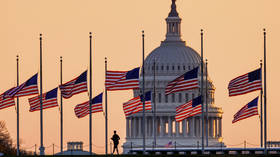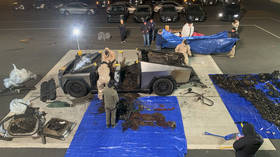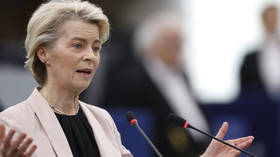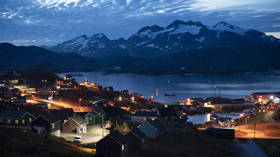ROAR: Russia, Poland “cannot have bad relations”

Moscow and Warsaw should work to continue improving relations despite another tragedy that occurred near the place of the 1940 events in Katyn, analysts believe.
The loss of so many representatives of political elite is a national tragedy for any state, Vremya Novostey daily said. “In this case, the effect of the catastrophe has been worsened for Poland and Russia because of a special historic background,” the paper noted.
Not only Polish, but also the Russian authorities have found themselves in a difficult position, the daily said. “Investigations of such emergency situations certainly require a special scrupulousness and diplomatic tact.”
“As the problem concerns ‘the second Katyn tragedy,’ the threat arises that any hints of partiality or the unwillingness of the Russian authorities to co-operate will reminders of the circumstances of the investigation of the events that took place in 1940,” the paper said.
The situation is even more dramatic because some days ago Russia and Poland made a step toward each other in this painful issue, when Prime Ministers Vladimir Putin and Donald Tusk met at the joint commemorating ceremony at the Katyn memorial complex, the daily said. “It was difficult even to imagine that they would meet again practically at the same place for a different tragic reason.”
The meeting between the Russian and Polish prime ministers in Katyn shows how quickly “seemingly constantly bad relations of the two countries” may change for the better, believes Artem Malygin of the Moscow State Institute of International relations. “This experience may become a model for solving other historical and psychological problems in relations of East European countries," he told Nezavisimaya Gazeta daily.
Recently, Polish President Lech Kaczynski had taken part in the process of improving relations with Russia, the paper said. The assessments of Kaczynski as a tough politician were used mainly during the first period of his work president, it added.
"Then he behaved rather as a politician who wanted to gain more supporters than as a statesman, representing all Poles," Malygin, a member of the commission on difficult issues in Russian-Polish relations, noted.
The latest manifestation of Kaczynski's criticism of Russia was his support for the Georgian President Mikhail Saakashvili's activities during the August 2008 events, Malygin said. "Later, he took part in the normalization of the Polish-Russian relations," he noted. "His participation in the memorial in Katyn should have played an important role in this process."
The late Polish leader was also expected to visit Moscow for celebrations on May 9 as the head of a member state of the anti-Hitler coalition, Malygin said. Polish soldiers will take part in a military parade in Red Square.
“The evolution of Kaczynski’s position toward Russia is obvious,” the analyst believes. The manifestations of unfriendly behavior towards Russia are not noticeable in Poland now, he noted, adding that this gives reasons to hope for improving relations between the two countries.
Moscow and Warsaw cannot have bad relations just because Russia is the second trade partner for Poland, Malygin believes. And Warsaw is a leading economic partner for Russia in Central and Eastern Europe.
Many analysts in Russia believe that the relations will not worsen whoever wins the early presidential election in Poland. At the same time, this election will influence the alignment of political forces in Poland, said president of St. Petersburg Politics foundation, Mikhail Vinogradov.
It is not clear if Kaczynski’s party will suffer or “the shocked nation will unite around it and around the authoritative figure of the former president’s twin brother JarosÅ‚aw,” Vinogradov told RBC TV channel.
“Poland is a parliamentary republic and the head of the government appointed by the Sejm [parliament] actually determines the internal politics of the state and influences the country’s position on the world arena,” the channel said. At the same time, the president is the head of state, and he may also influence foreign policy, it added.
Tusk’s Civic Platform party will have more chance of winning the election because it now holds the two main positions in the country, the prime minister and the acting president, Gazeta.ru website said.
Bronislaw Komorowski, who replaces the late president until the election, may “end the war at the top,” Tusk believes. On the other hand, the Kaczynski brothers’ Law and Justice Party may be weakened in the wake of tragedy, the website said.
The tandem of the Kaczynski brothers was a new symbol of post-Soviet Poland, said Evgenia Voyko of the Center for Political Conjuncture. They both fought for a new political course of their country, and the loss of one brother means a serious loss for this course and for political elite, she noted.
“It is clear that it will be difficult for JarosÅ‚aw to defend the values that they promoted in the past, especially in the 1980s,” the analyst noted. “Although he is also a charismatic figure, but the new Poland was mainly based on the brothers’ tandem,” she noted.
“The loss of President Kaczynski and other representatives of Polish elite in the air crash near Smolensk has become a new serious test for the Polish and Russian peoples,” Vedomosti daily wrote in the editorial called New Katyn.
The accident was “one of the most tragic events in the tragic history of Polish-Russian relations,” the paper noted. Now anti-Russian sentiments in Poland may get a new impetus, first of all during the presidential campaign, the daily added.
At the same time, possible aggravation of anti-Russian attitudes in Poland may tempt the Russian leadership to take offence again, the paper said. “There is a chance that the two countries may turn away each other once and for all, and there is a chance for historic reconciliation,” Vedomosti observed.
“In this sense, the Russian citizens and the leadership are behaving in a proper manner,” the paper noted. President Dmitry Medvedev addressed the Polish people immediately and declared a day of mourning. Premier Vladimir Putin headed the commission investigating the causes of the catastrophe and visited the place of the tragedy.
On April 11, Russia 1 state TV channel, which broadcasts throughout the whole country, showed Andrzej Wajda’s film Katyn. A week ago, on the eve of the 70th anniversary of the events in Katyn, the film was shown by another state channel, Kultura. “The second showing for all the country is undoubtedly a state decision and a very appropriate one,” Vedomosti said.
“It is difficult to find two peoples with relations so imbued by mutual distrust,” the paper noted. And the current situation is very complicated, and there is only one possible decision to overcome “a terrible symbolism of the past,” it added. Both countries should be patient and very attentive to each other, “first of all Russia should be more attentive to Poland,” the paper noted.
Sergey Borisov,
Russian Opinion and Analysis Review, RT














